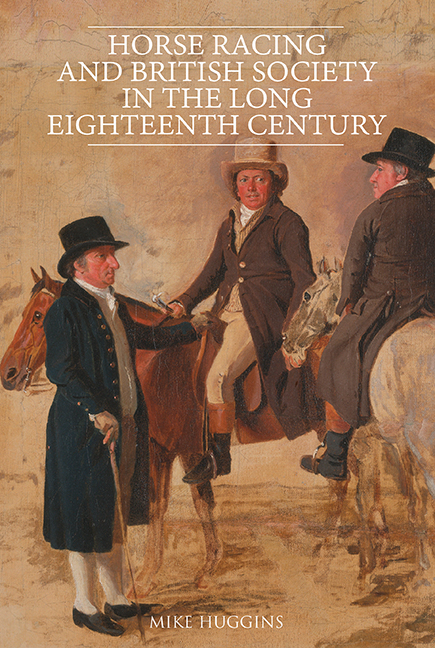Book contents
- Frontmatter
- Contents
- List of Illustrations
- List of Tables
- Acknowledgements
- Further Matter
- Introduction: Setting the Scene
- 1 The ‘Race Week’ in British Social Life
- 2 The Secret World of Wagering
- 3 Horse Racing and British Politics
- 4 Racing and its Rules
- 5 Running the Race Meeting
- 6 The Racehorse, its Ownership and Breeding
- 7 Vital Professionals: Jockeys, Grooms and Trainers
- Conclusion
- Bibliography
- Index
1 - The ‘Race Week’ in British Social Life
Published online by Cambridge University Press: 28 June 2018
- Frontmatter
- Contents
- List of Illustrations
- List of Tables
- Acknowledgements
- Further Matter
- Introduction: Setting the Scene
- 1 The ‘Race Week’ in British Social Life
- 2 The Secret World of Wagering
- 3 Horse Racing and British Politics
- 4 Racing and its Rules
- 5 Running the Race Meeting
- 6 The Racehorse, its Ownership and Breeding
- 7 Vital Professionals: Jockeys, Grooms and Trainers
- Conclusion
- Bibliography
- Index
Summary
THE annual race week has remained a largely unexplored dimension of early modern urban life, despite the increased historiographic attention to eighteenth-century recreation, politeness, sociability, civility and the growth of consumerism, especially the demand for new semi-luxury consumer goods, all of which race meetings encouraged. By c.1800 racing was increasingly incorporated into elite everyday life, alongside political and estate administration activities, parties, travel, seaside and spa visits and London ‘society’, as well as the urban world of politeness and civility.
The term ‘race meeting’ was a powerful reminder that the racecourse was a liminal site where ‘society’ met, bringing together people from varying backgrounds in commercial and social intercourse, and fostering urban improvements. Urban race meetings and their surrounding social life offered a more bourgeois ‘public sphere’ attracting cross-class interest and support, especially in towns whose cultural revival exemplified an ‘urban renaissance’, with their provincial economies stimulated by new patterns of consumption and sociability. What was variously called the ‘race ground’, ‘horse course’ or ‘racecourse’ and its associated leisure-related urban buildings were important social spaces, constructed, utilized and given meaning to by their users. Races merged social and economic functions: pleasure, social interaction and important speculation/commercial activities. These impacted on social life, cultural values and personal and political networks. Their activities and associated competences were ‘polite’ and many townspeople and elite visitors accessed them in ways that simultaneously reflected the inherent social mobility of urban society and the widespread acceptance of the preservation of social distinctions.
Though often described as ‘race week’, few meetings lasted a week. Up to 1750, between 60 and 70 per cent lasted two or three days, occasionally with a day's break. The smallest meetings, amounting to around 20 per cent of the total, lasted a single day. Over the next sixty years one-day meeting proportions declined towards around 4 per cent. Twoor three-day meetings became the norm and, from 1800 onwards, almost half of meetings lasted three days. Meetings of five or more days were rare outside Newmarket and regional centres such as Newcastle or York.
Despite nuances of status and social hierarchy, race week, like assizes, quarter sessions or fairs, created a context for the social mixing of overlapping networks, town and county, rich and poor, men and women, old and young, in complex intermingling interrelationships. They were special experiences to be saved up for and looked forward to.
- Type
- Chapter
- Information
- Publisher: Boydell & BrewerPrint publication year: 2018



